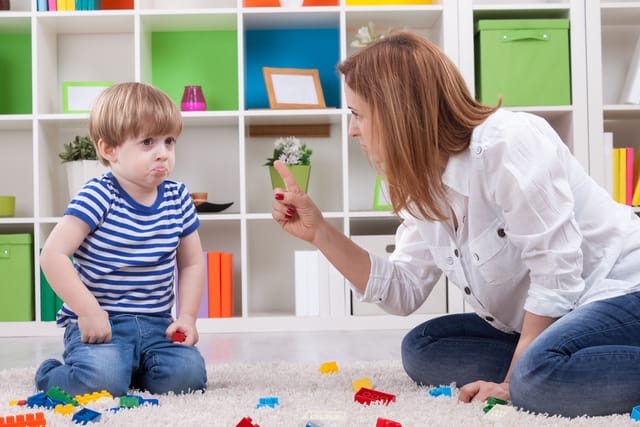In the heat of anger, it’s easy for words to slip out that we later regret. However, what we say to our children, especially when we’re frustrated, can leave a lasting impact. Here are phrases to avoid to protect your bond and their emotional security.
1. “I wish you were never born.”

This cuts to the core of a child’s existence, making them feel like an unwanted burden. Even if said impulsively and not literally true, it can still destroy their sense of belonging and worthiness. Children, especially young ones, take things literally and will hold onto them long after you’ve forgotten. The damage caused by this kind of statement lasts far longer than a moment of parental frustration.
You may also like: 16 Habits Of People Who Are More Attractive Than They Think
2. “You’re just like your father/mother.” (Used as an insult)

Dragging past hurts or disappointments into heated arguments with your child is deeply unfair. They’re not responsible for other people’s actions. If there are unresolved issues in your adult relationships, address them separately. Using your child as a weapon in old battles undermines their sense of self and can distort their view of family dynamics, GoodTherapy notes.
Don’t miss out – follow Bolde for exclusive content daily
3. “You’re stupid/worthless/useless.”

Attacking a child’s character with insults undermines their self-esteem and leaves deep emotional scars. Instead of resorting to hurtful labels, separate the behavior from the person. Explain why their actions are inappropriate and how they made you feel, without attacking their inherent worth. Children learn by example, and lashing out with verbal abuse teaches them that name-calling is an acceptable way to address conflict.
You may also like: 19 Stereotypes About The South That Are Totally Untrue
4. “Why can’t you be more like [sibling/friend]?”

Comparison breeds resentment and undermines a child’s individuality. Every child is unique with their own strengths and weaknesses. Creating a competitive environment within your household pits children against each other. Focus on celebrating their unique qualities and helping them reach their own potential, rather than constantly measuring them against other people.
Don’t miss out – follow Bolde for exclusive content daily
5. “I’m so disappointed in you.”

While it’s natural to feel disappointed sometimes, it’s crucial to convey this in a constructive way. Focus on the behavior that led to the disappointment, not your child’s overall character. For example, instead of a blanket statement about being disappointed in them, express that you’re disappointed by their choice to not complete their homework. This emphasizes that your love is unconditional, even when their actions fall short of your expectations.
You may also like: Things You Should Never Say To Someone You Love
6. “Stop being so sensitive!” / “Don’t cry!”

Dismissing a child’s emotions invalidates their experience and teaches them to suppress feelings rather than learn healthy ways to express them. Let tears flow; offer comfort and a listening ear. Guide them to name their emotions: “You seem really angry that you can’t play video games anymore.” This helps them develop emotional vocabulary and the understanding that all feelings are valid, even the unpleasant ones.
Don’t miss out – follow Bolde for exclusive content daily
7. “You’re making me so angry, I could…” (or any threats of violence)

Any threat of physical harm, even if you don’t truly intend to follow through, creates a sense of fear and instability. Children need to feel safe with their caregivers, and threats destroy that trust. It also models unhealthy coping mechanisms, suggesting that responding to anger with violence is acceptable. Instead, demonstrate how to manage intense emotions: “I’m really frustrated now, so I need a few minutes to calm down before we can continue talking.”
You may also like: Reasons Your Adult Children Want Nothing To Do With You
8. “Wait until your father/mother gets home!”

Using the other parent as a looming threat undermines your own authority and creates a sense of instability for the child. It teaches them to fear consequences rather than understand why their behavior was wrong. Instead, parents need to present a united front. If you feel overwhelmed in the moment, step away to calm down, and then address the misbehavior directly and consistently.
Don’t miss out – follow Bolde for exclusive content daily
9. “You’ll never amount to anything.”

Questioning your child’s potential is a blow to their dreams and ambitions. Your words hold immense power, particularly during their formative years. Even if you’re frustrated by current behavior, avoid sweeping generalizations that plant seeds of self-doubt. Instead of undermining their future, focus on addressing the issue at hand and encourage them for the effort they are putting in towards positive change.
You may also like: People Who Had Unhappy Childhoods Usually Develop These Traits
10. “You deserve this punishment!”

Framing punishment as a form of personal vendetta your child deserves, rather than a consequence for their actions, can create resentment and a warped view of power dynamics in relationships. While explaining that their behavior is unacceptable, convey that consequences are intended to help them learn to make better choices in the future, not simply a payback for making you angry.
Don’t miss out – follow Bolde for exclusive content daily
11. “This is all your fault!”

Placing the weight of every problem solely on a child’s shoulders cultivates a crippling fear of making mistakes. Life is full of complexities, and it encourages an unhealthy sense of guilt when children feel disproportionately responsible for negative events beyond their control. Take a deep breath and address the specific issue rather than assigning blame for all your troubles.
You may also like: How A Narcissist Acts When You Start Seeing Through Their BS
12. “I don’t like you right now.”

Children, especially young ones, need reassurance that your love is unconditional, even when their behavior disappoints you, The New York Times explains. Separating the child from their actions is crucial, so they know that while their behavior might need redirection, your love and support for them remains steadfast. Instead, frame it as, “I love you, but I don’t like your behavior right now.”
Don’t miss out – follow Bolde for exclusive content daily
13. “I don’t care about your problems.”

Even if their troubles seem minor compared to adult responsibilities, dismissing their concerns teaches them that their feelings are insignificant. This can make them hesitate to seek support later when facing truly serious challenges. Validate their emotions and offer guidance, even if you can’t fully solve their problems for them. Show them that you’re a safe person to turn to, regardless of the scale of their worries.
You may also like: 15 Things To Keep To Yourself Because They’re Nobody’s Business But Yours
14. Mocking their appearance or belittling their interests.

Ridiculing their looks or passions deeply destroys a child’s sense of self-worth. Their developing identity is fragile, and hurtful comments about their appearance can fuel body image issues and insecurities. Shaming what they love makes them feel as if their genuine passions aren’t worthy of respect or support. Celebrate their individuality or, at the very least, refrain from harmful comments.
Don’t miss out – follow Bolde for exclusive content daily
15. Giving the silent treatment for extended periods.

While taking time to calm down is healthy, prolonged silent treatment creates fear and uncertainty. It leaves your child feeling powerless and anxious, wondering if you’ll ever truly forgive them. Even if still upset, communicate: “I’m too angry to talk about this calmly right now, but we will discuss it later when I’ve had time to cool off.”
You may also like: How A Narcissist Acts When They Can’t Fool You Anymore
16. Bringing up past mistakes in unrelated arguments.

Dredging up past misbehavior makes your child feel like they can never truly earn redemption. While patterns of misbehavior need to be addressed long-term, bringing up the past in a heated moment isn’t constructive. Focus on the present issue at hand. Show them you believe in their ability to improve with time and effort, even when they stumble along the way.
Enjoy this piece? Give it a like and follow Bolde on MSN for more!



